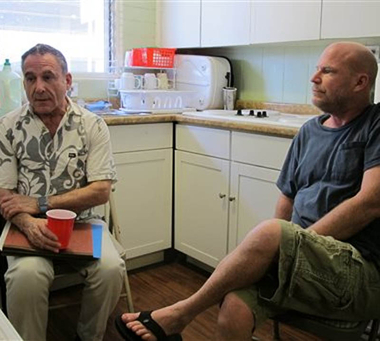Homeless shelters struggle with loss of federal funding

Honolulu (AP) — David Willett lived in a tent and struggled with drug addiction before coming to Gregory House, a Honolulu shelter that has provided temporary housing for people with HIV and AIDS for more than a decade.
But the shelter is among many that face steep federal funding cuts this year, and Willett and other residents worry about its future.
"I would be dead if it wasn't for Gregory House," said Willett, 49. "We just desperately need this program."
Shelter managers in Hawaii are scrambling to figure out how to keep a roof over the heads of hundreds of homeless people, and similar cuts are being made across the nation this month as the federal Department of Housing and Urban Development shifts its grant money to programs that focus on permanent housing.
After hearing the news, Gregory House residents held hands in the kitchen — its walls decorated with the words "live," ''believe" and "laugh" — and shared stories about how living in the shelter helped them battle drug addictions and disease.
The transitional shelters and programs — many operating for more than a decade — applied for grants and were scored on factors including the community's success at reducing homelessness. Local communities across the nation decreased homelessness by 11 percent since 2010, according to HUD. But Hawaii — with the highest rate of homelessness in the nation — bucked the trend, with more people falling into homelessness every year since 2011.
Each local area ranked their programs in order of priority when submitting the applications to HUD, and programs at the bottom of the list faced stiff competition nationwide.
Programs also were graded for the first time in the annual competition on whether local groups serving the homeless are working to decriminalize homelessness.
"We have been looking at policies that criminalize homelessness for many years now, and they don't help," said Norm Suchar, director of office of special needs assistance programs at HUD.
When communities criminalize homelessness, people end up going to jail for sleeping or urinating in public places, Suchar said. They remain homeless, because it's harder to get a job with a criminal record, and the community spends more money on jails and emergency room visits, he added. While HUD hasn't released how it graded the individual programs, several cities with policies that criminalize homelessness experienced cuts.
Honolulu County, which banned sitting and lying down in Waikiki and other places in 2014, saw overall funding from HUD slashed by more than $525,000 this year, impacting programs that house about 465 people.
Miami-Dade County got $2.5 million less from HUD than it did last year. While some programs in the Miami area saw increased funding, cuts to existing programs totaled about $6 million, said Ron Book, chairman of the Miami-Dade County Homeless Trust. That impacted 23 programs providing more than 750 shelter beds, including transitional shelters serving victims of domestic violence, Book said.
"If you don't have the money to fill the gap, you're going to put those women and those children directly into harm's way," Book said.
Programs in Baltimore, Maryland saw their overall funding dwindle by $1.6 million. When prioritizing its grant applications, the city put transitional housing programs at the bottom of the list, said Bill McCarthy, executive director of Catholic Charities of Baltimore. A new permanent housing project got about $2 million, but transitional housing programs lost $3.8 million for 18 programs with hundreds of beds, he said. That included My Sister's Place Lodge, which houses 27 women with disabilities such as mental illness, and Christopher's Place, a shelter that helps men transition back into the workforce after serving time in prison.
"You're talking about hundreds of beds that are lost without the support of HUD," McCarthy said. "The city had no plan in place with what they would do with the individuals that were living in these programs."
Nationwide, many of the programs that lost money were transitional housing. While HUD believes there's a place for transitional housing, data shows that programs offering permanent housing have better long-term outcomes, Suchar said.
"We have a very difficult homelessness problem and not all the resources that you would want to have, so we prioritize," Suchar said.
Not all programs lost money; funding from HUD was up overall. HUD awarded nearly $2 billion in grants for homeless programs, up from $1.8 billion last year.
Houston had a large increase in funding, getting an additional $9 million for a total of $32 million. New York City also saw a big increase, with an additional $17 million boosting its total to $122 million.
HUD's federal office is working with local groups to ensure that if a de-funded shelter shuts down, the residents have an alternative place to go, officials said. But with no specific plan in place, local shelter managers are worried.
"I can't in good conscience just allow this group of people to become homeless because of some ill-arrived decisions from a federal agency," said Jon Berliner, executive director of Gregory House Programs. "The impact of this is just going to be unbelievably awful."
By Cathy Bussewitz, Associated Press. Copyright 2016 The Associated Press. All rights reserved. This material may not be published, broadcast, rewritten or redistributed.
The Gayly – June 8, 2016 @ 8 a.m.





